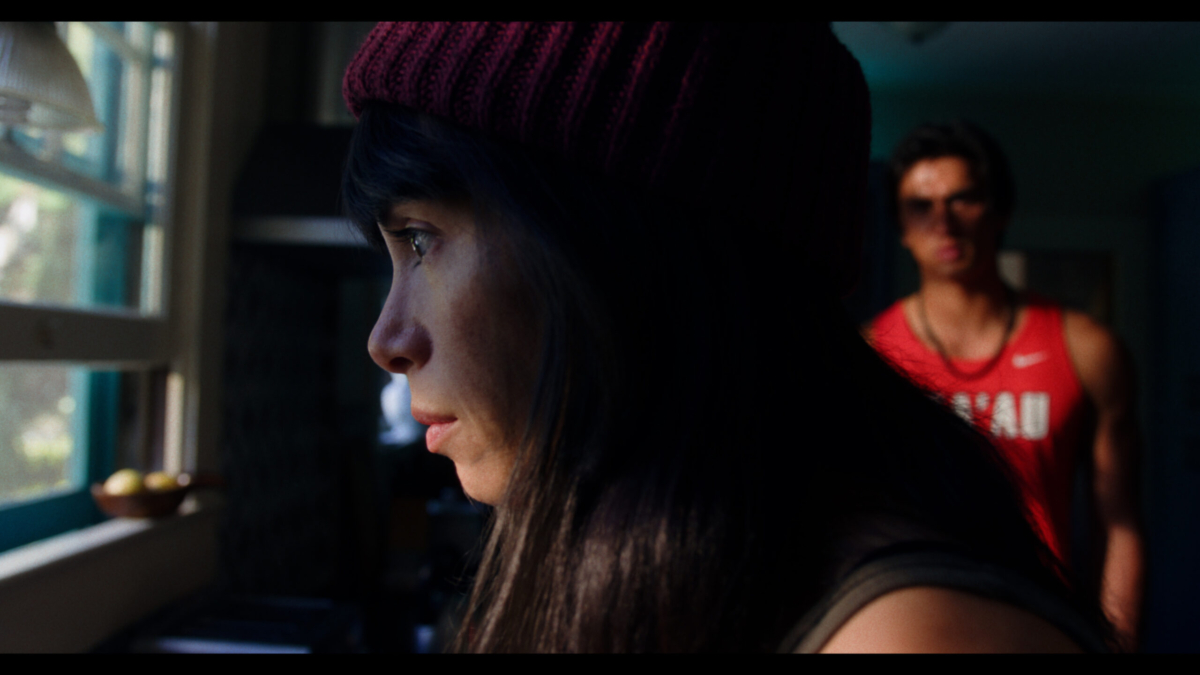Moral Grays In ‘Chaperone’
Interview sections were edited for clarity and concision.
When a 17-year-old boy mistook director Zoë Eisenberg for a fellow high schooler and asked her out to a party, she replied incredulously, “I’m 30. I’m also married.” They shared a laugh before parting ways, but the encounter also prompted a question for Eisenberg: what kind of woman would have lied? Where would she have to be in her life to have said yes?
“Chaperone”’s Misha (Mitzi Akaha) feels like she’s going nowhere. On the eve of her 30s, her 12-year tenure at a failing local theater looks to most as if she is settling. Misha declines a promotion due to the responsibility it would require and swears contentment living alone with her cat in a house she inherited from her grandmother. It’s the judgmental people around her that bring her stress, and in the small coastal town of Hilo, Hawai’i Island, they are everywhere. When high schooler Jake (Laird Akeo) mistakes her for a peer, Misha finds an opportunity for solace through her lie.
Eisenberg made clear that her debut feature was not a moral tale. “I’m always interested in human choice. I tend not to place a lot of morality on my characters, because we’re all just trying to get our needs met.” But that’s not to say that the viewer shouldn’t feel conflicted, Eisenberg said. “I wanted everyone to feel a little bit sick to their stomach. Because as we’re watching them, there’s a lot in the relationship that is beautiful. And so we find ourselves wanting to root for them, even though we don’t want to root for them, because she’s lying. And it’s fucked up.”
This feeling advances as Jake’s senior year progresses and Misha entangles herself further in her lies. She meets Jake’s surprisingly receptive mother Georgia (Krista Alvarez) whose woman-to-woman conversations about her son almost feel conspiratorial. Misha becomes friends with Jake’s peers and throws them a house party, while her own family and friends find the situation to be an extension of her aimless immaturity. But all parties must end, and while the narrative waives judgment, Misha’s actions still incite consequences for which she pays dearly. By the time she reveals her age to Jake, her life has fallen apart.

On the film poster and throughout their marketing material, “Chaperone”’s tagline is “This is not a love story.” “It’s a tragedy,” said Eisenberg, and not just for Jake, whose first love was built on a dishonest power imbalance. It’s tragic for Misha, too, as she approaches Jake’s high school in the final scene, potentially doomed to repeat her cycle of dishonesty. The open ending cinches “Chaperone”’s amorphous morality, but it also suggests a more realistic truth: that growth might take time beyond the confines of a film.
For Eisenberg, the tragedy is also in society’s judgment of Misha, which she found mirrored by the real world: “[In development], many people thought that ‘Chaperone’ was a slacker film. And I was like, I don’t view Misha as a slacker. People in her life view her as a slacker — she kept the same job for years and she is in a privileged place where she doesn’t have to worry about the cost of living. Most of us don’t have that luxury; but if we did, how would we live our lives? I was interested in this status quo character living on an island — I know so many people in Hawai’i who have done the same job for 20 years and love it. And it can be simple work. We need simple work. And yet, I don’t know how to talk about it without being pejorative; we’re such an ambitious and focused culture.”
Standing up for such sentiments is not the only struggle with independent film – especially one made in Hawai’i, where the film infrastructure is not as developed as other tentpole industry locales. For Eisenberg, scrappy Hawaiian filmmaking was second nature: “I’ve never made a film, not in Hawai’i, and I’ve always just been a work-with-what-you-have-type.” Filming locations were homes and haunts of local friends and community in Hilo, while the script would change to fit the actors’ cast; the entire “Chaperone” team was all from or had ties to Hawai’i. It’s refreshing when Hawai’i plays itself, beyond a diegetic sense of representation. That is where independent filmmaking thrives, in an enmeshing between narrative and its immediate contexts.
“Chaperone” is but a part of a recent rise of indie Hawaiian film upon which Eisenberg proudly reflects: “It’s been speeding up again in the last 10 years. Filmmakers from Hawai’i used to feel like ‘Okay, I have to go to film school.’ And then I have to move to one of the big film hubs to be able to be a filmmaker. They didn’t feel like they could be a filmmaker in Hawai’i.” But a lot of that changed during the COVID pandemic. As the whole world restructured itself, the islands’ community found an opportunity to look around and build anew. “We saw a lot of those filmmakers move home and realize that ‘Okay, not only can I make this work, but I should make this work.’ We want our stories to be told by people that are from here. And unless we stay here to do it, it’s not going to happen.”
“Chaperone” screened at the 47th Asian American International Film Festival.

